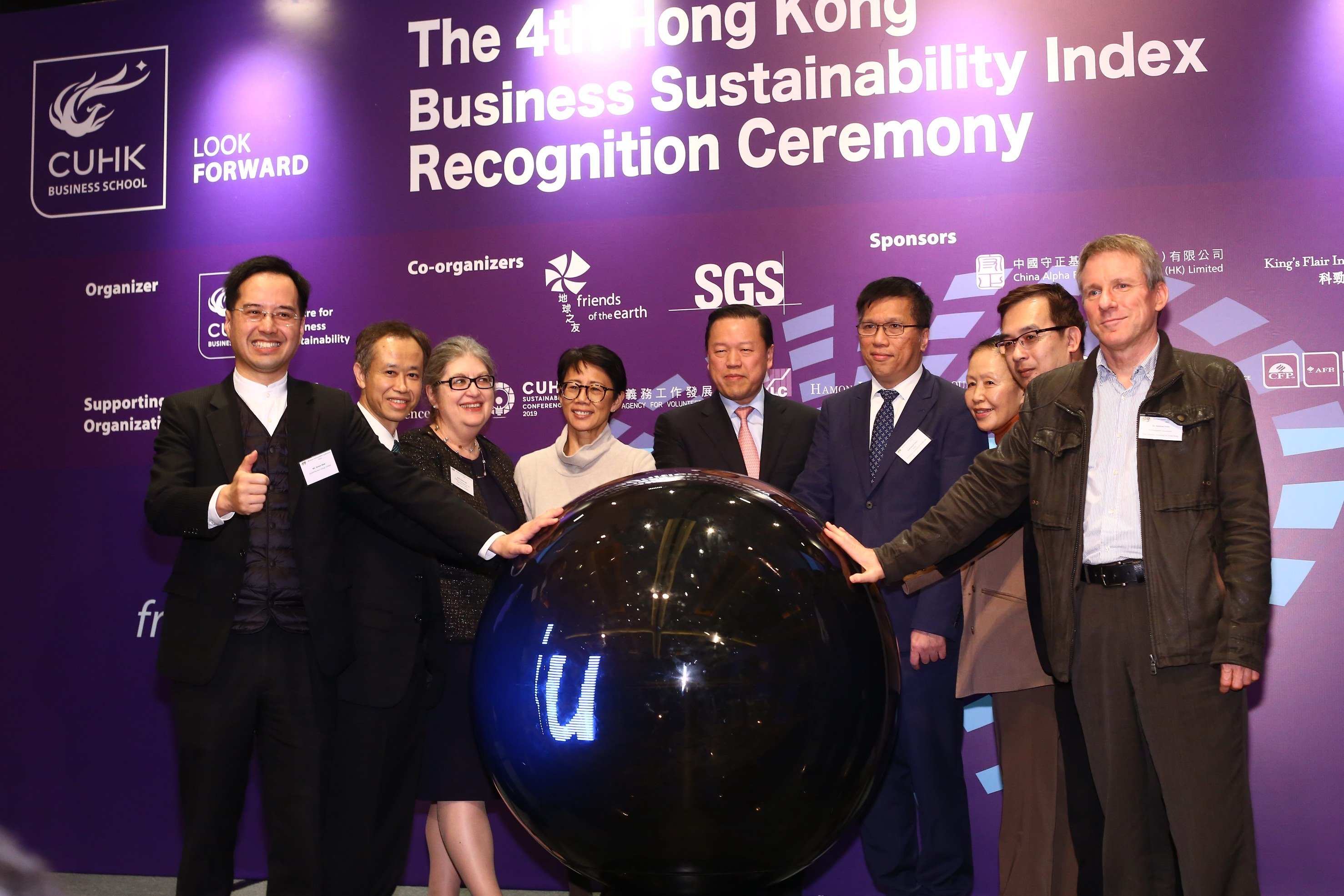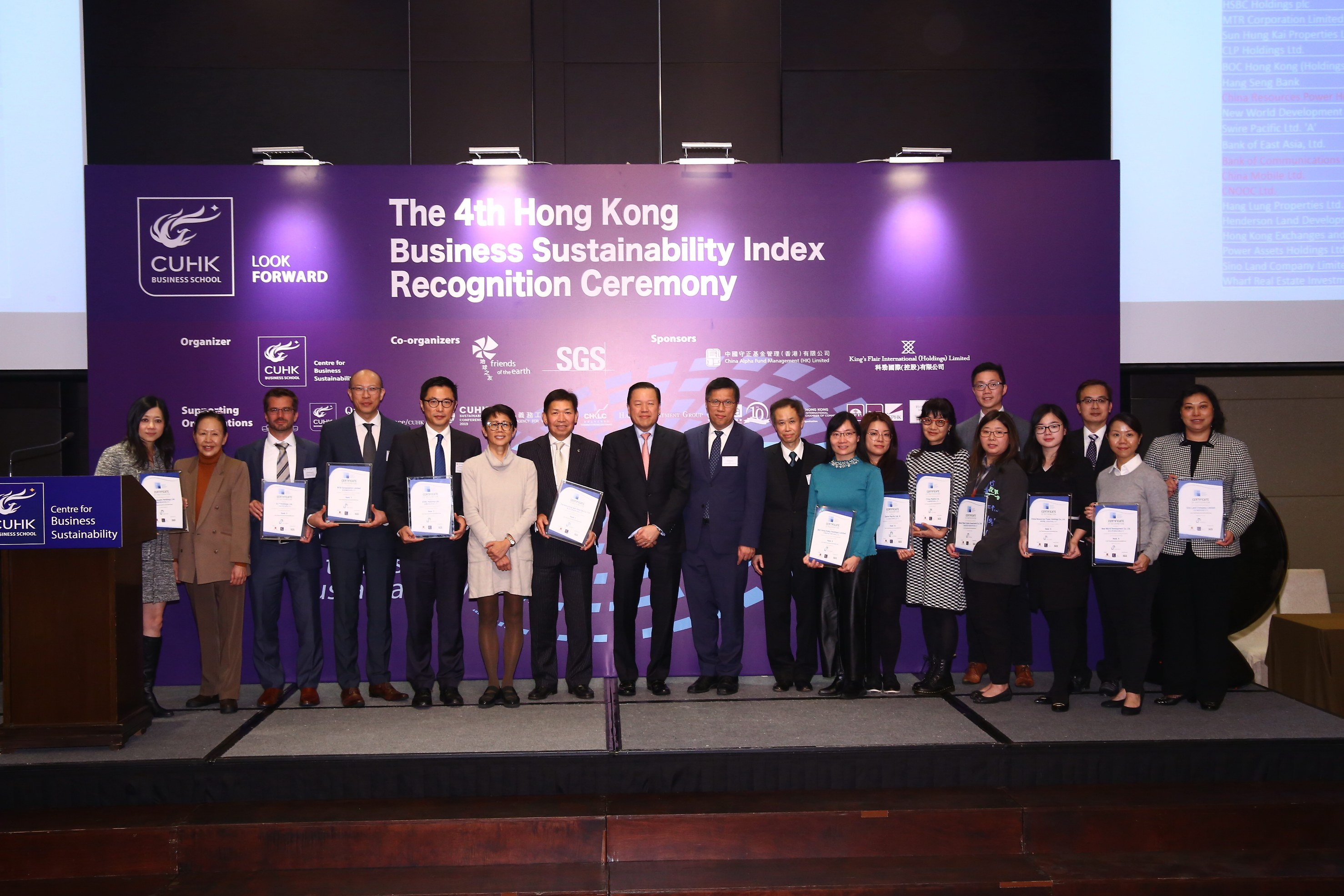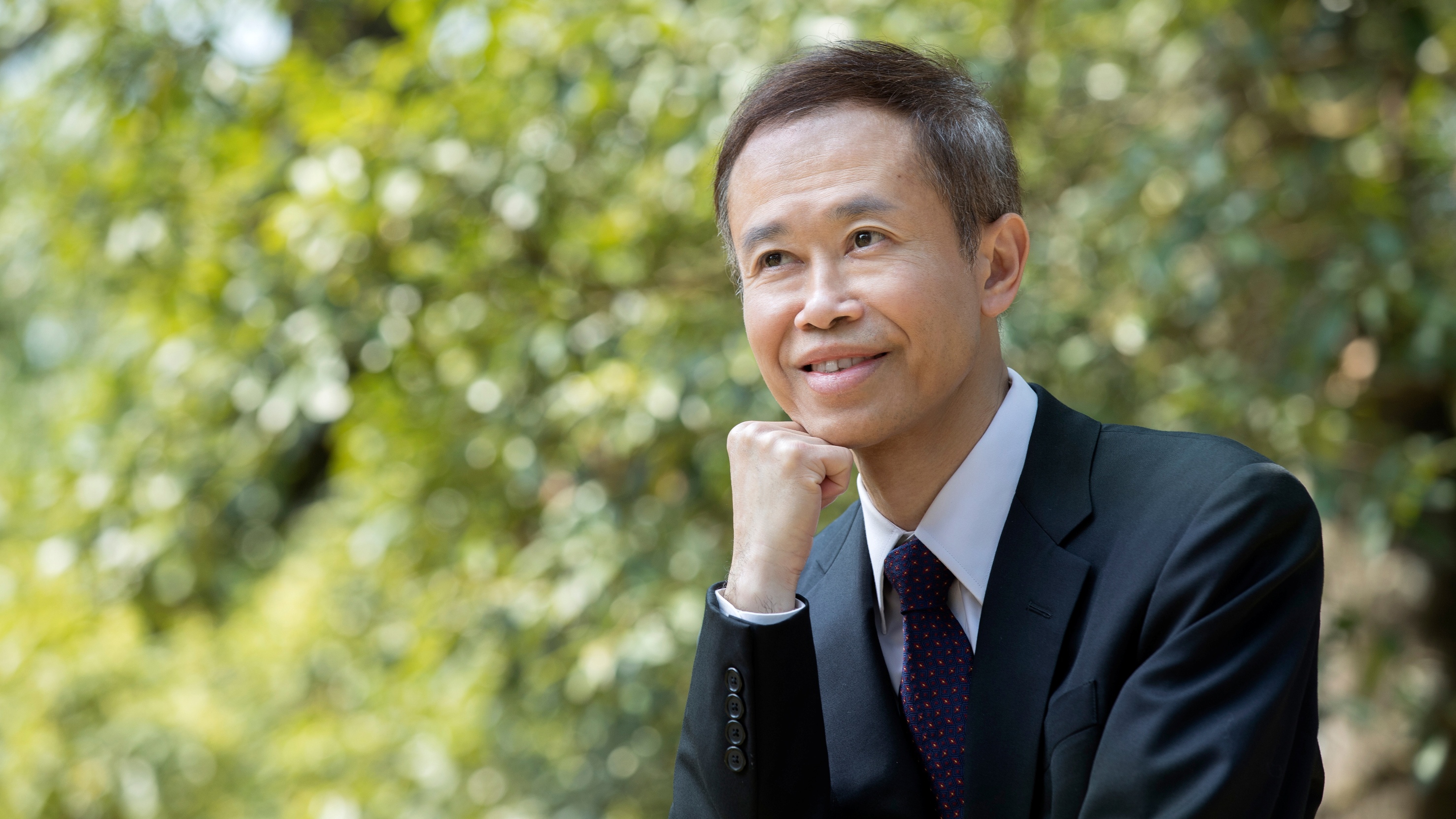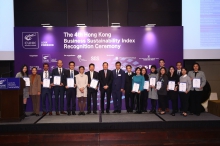News Centre
CUHK Business School Announces the 4th Hong Kong Business Sustainability IndexThe top 10 company ranking announced for the first time; compilation of a business sustainability index for the Greater Bay Area is in progress
The Chinese University of Hong Kong (CUHK) Business School’s Centre for Business Sustainability (CBS) announced results of the 4th Hong Kong Business Sustainability Index (HKBSI) today, where leading companies listed in Hong Kong have shown increasing concerns for corporate social responsibility (CSR) and business sustainability. The top 10 HKBSI company ranking was also unveiled for the first time.
Compared to the results of the 3rd HKBSI released in July last year, the overall average score of the 50 constituent companies of the Hang Seng Index (HSI) as at 6 June 2018 in the 4th HKBSI was 56.01 (out of 100 points), an increase of 10 per cent, whereas the average score of the top 20 Index companies has recorded 75.57 (out of 100 points), up by around 4.29 per cent from that of the last round.
HKBSI aims at encouraging companies in Hong Kong to adopt corporate social responsibility (CSR) as a progressive business model for them to achieve business sustainability. Putting a spotlight on the largest companies as a leading force, 50 HSI constituent companies were invited to complete an online assessment questionnaire concerning their CSR performance for the financial year ended in 2016/17, based on publicly available information. Each company was assessed in three major areas, namely CSR Values, CSR Process (comprising CSR management and practices) and CSR Impact against seven stakeholder groups, as well as the company’s contributions to economic, social and environmental sustainability. As the Technical Partner of the project, SGS Hong Kong Limited conducted sample check and verification of the information provided by individual companies.
Prof. Carlos Lo, Director of CBS, explained that the assessment of HKBSI is based on the unique “Values – Process – Impact” (VPI) model, which was developed by the Sustainability Management Research Centre and launched in 2015. Prof. Lo said, “There has been progressive advancement in the performance of business sustainability over the past four rounds of HKBSI. However in this latest round, despite an increase in the overall average score, the standard deviation was also visibly large (18.99 points), reflecting a huge performance gap between the top and bottom companies.”
For the top 20 HKBSI companies, the mean score of this round has recorded a significant improvement of 32 per cent (from 57.25 points in the 1st HKBSI). On the other hand, the number of “Explorer” companies with scores below the overall average of 50 greatly reduced. Eight companies achieved over 80 points and reached the “Pace-setter” level which is comparable to international standard. The Hong Kong and China Gas Company Limited is the best-ranked company which is also the first ever company achieving over 90 points and reaching the top level of “Exemplar”. This reflected that the company’s performance of business sustainability has attained the international standard.
Among the assessment aspects of VPI, in comparison with the results of the 3rd HKBSI, all the four aspects (Value, Management, Practice and Impact) have seen improvements. “Values” has registered the highest mean score of 66.34 points and the highest growth of 22.67 per cent in the 4th round. “Process-Management” (61.36 points) and “Process-Practice” (62.35 points) have also performed well, recording 20.38 per cent and 66.98 per cent rise respectively. The average score of “Impact” (39.23 points) has chalked up an impressive increase of 20 per cent; yet, “Impact” has remained as the weakest area across the board. As for the top 20 HKBSI companies, their scores in “Value” and “Process” have been stable (above 80 points) in the latest round, which shows that these companies are mature in the two aspects. These companies’ average scores on “Impact” has been improved from 50.75 to 57.66, up by 14 per cent from that of the last round.
The results of the 4th HKBSI assessed under the VPI model reflects that more companies have been increasingly concerned about business sustainability and hence have committed diligent effort in implementing CSR practices in this round of assessment. Prof. Lo indicated that this year, 86 per cent of the index companies published standalone Environmental, Social and Governance (ESG)/sustainability report, and the figure was only 72 per cent last year and 2 per cent even with no reporting.
Prof. Lo attributed the high score in “Values” to the companies’ increasing adoption of conceptual frameworks related to business sustainability and CSR, as well as their greater concern for various stakeholders. It shows that companies have increasingly approached their CSR activities in a strategic manner, with defined priorities aligned with their business drivers, thus enabling the companies to leverage their strengths for achieving better impact on the beneficiaries.
Commenting on the “Impact” of the VPI model, the weakest area that companies performed, Prof. Lo pointed out that many companies are still implementing CSR on project-driven basis. Although many have begun to take “Impact” more seriously, they still lack the ability to measure, both qualitatively and quantitatively, the results and impacts of their CSR practices and activities. He said evaluation and review of these practices are still relatively less developed in many companies, and it will be important for them to apply measurable Key Impact Indicators and comparable data related to CSR management. Such evaluations are useful for companies in not only improving their internal governance, but also strengthening their external accountability.
Currently, more than half (52 per cent) of the HSI constituent companies are non-Hong Kong based companies, comprising of H-shares, red chips and other mainland Chinese firms listed in Hong Kong. The overall average score of these companies in the 4th HKBSI recorded a 14.43 per cent rise to 48.44 (out of 100 points) when compared to that of Hong Kong based companies (7.02 per cent), showing a bigger performance improvement in business sustainability. One non-Hong Kong based company even occupied a place in the Top 10 ranking, while three others were ranked between 11-20.
Echoing the recently launched Hang Seng Stock Connect Hong Kong Big Bay Area Index, CBS will extend its sustainability index project to the Guangdong-Hong Kong-Macao Greater Bay Area and even the Greater China region. The compilation of a new business sustainability index that covers both Hong Kong-listed stocks and mainland-listed A-shares with operations in the Greater Bay Area is in the pipeline. 66 constituent companies from the Hong Kong and Shenzhen stock markets that are eligible for southbound trading under the Stock Connect scheme will be included. In the future, CBS also plans to compile a business sustainability index for constituent companies of the Taiwan Capitalization Weighted Stock Index (TAIEX). Prof. Lo indicated that when mainland China, Hong Kong and Taiwan have their own business sustainability indices, we can then compile a consolidated one for the Greater China region with HKBSI serving as a benchmark. The consolidated business sustainability index can not only encourage and motivate companies in the region to adopt CSR as a progressive business model for them to achieve business sustainability, but also to serve as a robust indicator for ESG investors in selecting companies with socially responsible corporate behavior to invest.
Please visit https://bit.ly/2SDfp9x to read the press release on CUHK Business School website.
About CUHK Business School
CUHK Business School comprises two schools – Accountancy and Hotel and Tourism Management – and four departments – Decision Sciences and Managerial Economics, Finance, Management and Marketing. Established in Hong Kong in 1963, it is the first business school to offer BBA, MBA and Executive MBA programmes in the region. Today, the School offers 8 undergraduate programmes and 20 graduate programmes including MBA, EMBA, Master, MSc, MPhil and Ph.D.
In the Financial Times Global MBA Ranking 2018, CUHK MBA is ranked 43rd. In FT‘s 2018 EMBA ranking, CUHK EMBA is ranked 29th in the world. CUHK Business School has the largest number of business alumni (35,000+) among universities/business schools in Hong Kong – many of whom are key business leaders. The School currently has about 4,400 undergraduate and postgraduate students and Professor Kalok Chan is the Dean of CUHK Business School.
More information is available at www.bschool.cuhk.edu.hk or by connecting with CUHK Business School on Facebook: www.facebook.com/cuhkbschool and LinkedIn: www.linkedin.com/school/3923680/.
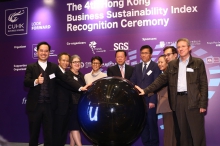
Prof. Kalok Chan, Dean of CUHK Business School (6th from left), Mr. Tim Lui, SBS, JP, Chairman of the Securities and Futures Commission (SFC) (middle), Prof. Carlos Lo, Director of Centre for Business Sustainability at CUHK Business School (2nd from left) and guests posed for a group photo during the launching ceremony of Centre for Business Sustainability.
